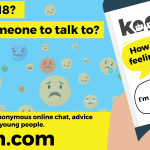On this page
What is stress?

Stress is the feeling of being under too much pressure and feeling unable to cope with a situation.
Stress can either be caused by our thoughts and anxieties, or by events and experiences.
A little bit of stress can be a good thing as it triggers our ‘fight or flight’ response which helps us deal with uncertain or dangerous situations.
But when the stress builds up and hangs around, we need to find a way to de-stress and stay calm.
The ‘stress bucket’ animation below shows how stress can build up and what this can feel like.
“How does stress affect us?“
People are affected by stress in different ways.
If you’re feeling stressed, you might:
- Have trouble sleeping or relaxing
- Find it hard to concentrate
- Eat more or less than usual
- Feel irritable, tearful, angry or unable to cope
- Have headaches
Try this: To reduce the stress you're feeling, think about things you can do differently to release some of this stress.
For example if you're going to school and revising for exams at evenings and weekends, this could be causing you stress.
For managing stress 1) Identify what's stressing you out? If you know doing specific things causes you to be stressed, organise tasks, create a 'To do' list, and include time out in your schedule for fun and relaxation. For example when preparing for exams, draw up a revision timetable to manage your time and allow for regular 30 minute breaks. 2) Think about what might help you to reduce stress? Like spending time with your pet, swimming, watching your fav movie etc! 3) Learn to be a good problem solver! Write down the problem and come up with as many possible solutions, then select the best solution. 4) Movement can help! Read more about the movement and mind connection.
Tools to help de-stress
- ChildLine’s Wall of Expression
- The Mix’s Stressheads game
- Breathing exercises
- Mind Charity advice – how to manage stress
Useful resources
- 5 Ways to wellbeing – 1.Connect with others, 2. Be active, 3.Take notice of what’s around you, 4. Keep learning, and 5. Give to others.
- Try our 30 day What’s Up challenge to make you feel good
“Don’t be afraid to seek help if you’re feelings are starting to get too much, it’s important to talk to someone you trust.”
Page updated on June 22nd, 2023 at 02:51pm





